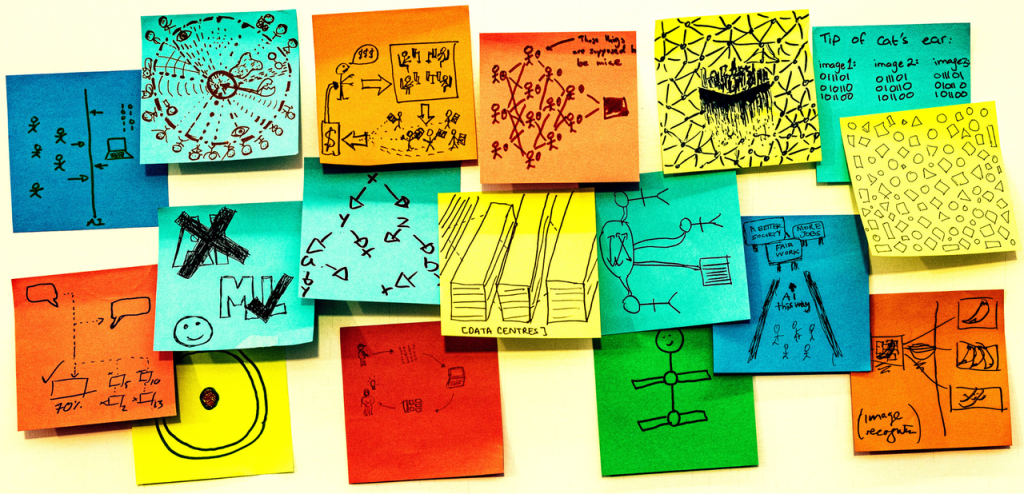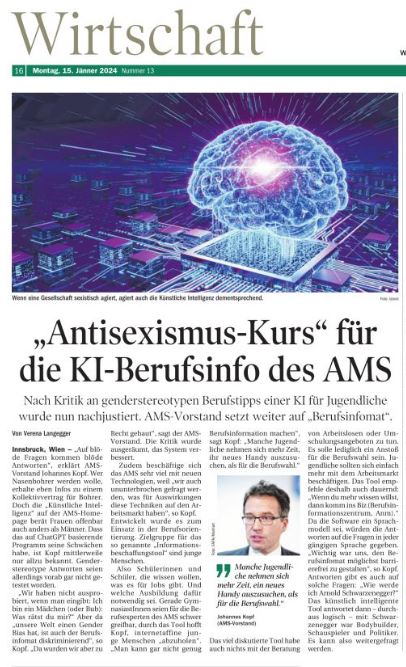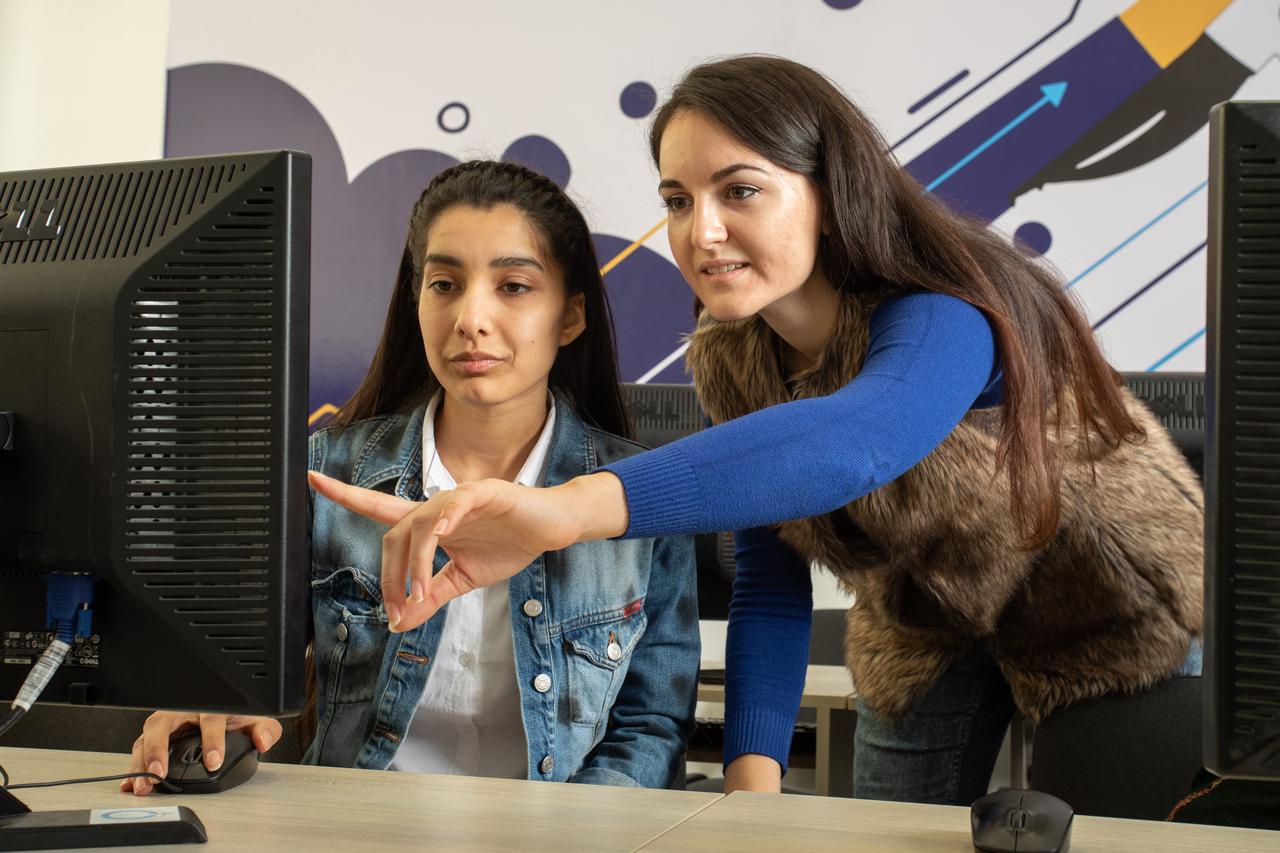
Regular readers of this blog will know that since 2019, I have been working on projects about developing chatbots for career guidance, in particular in providing access to Labour Market Information. The first project, CiCi was funded by the UK Nesta Foundation and the second is a European Erasmus+ project, CareerBot. Both are essentially hybrid in design, with scripted dialogue incorporating a limited amount of AI, in the form of Natural Language Processing. But since the start of these projects there has been the release of Generative AI, initially through the release of OpenAI’s ChatGPT in November 2022. Generative AI, with its ability to create new and original content, has been hailed as a potential game-changer in the field of careers guidance. However, its implementation poses both exciting possibilities and significant challenges that require careful consideration. Concerns include potential biases, lack of human connection, and over-reliance on automation necessitate a critical examination of this technology's implications.
Despite these concerns there has been growing interest and pilot testing of the potential uses of Generative AI in careers guidance have:
- Personalized Career Exploration: AI tools can analyse vast amounts of labour market data, including job descriptions, skills requirements, and salary trends, to generate personalized insights on suitable career paths aligned with individual skills, interests, and aptitudes. This can empower individuals, particularly those unfamiliar with career options, to explore diverse possibilities and make informed decisions.
- Interactive Skill Development: AI-powered chatbots can simulate real-world career scenarios, providing personalized feedback on job interviews, salary negotiations, and networking interactions (Gauthier, 2023). This fosters practical skills development in a safe and dynamic environment, preparing individuals for actual encounters with confidence.
- Content Creation and Delivery: AI tools can generate customized resumes, cover letters, and interview preparation materials tailored to specific job descriptions. This can save time and improve the efficacy of job applications, especially for individuals with limited resources or writing skills .
- Data-Driven Career Insights: AI can analyse trends in job postings, skills requirements, and salary ranges across various industries, providing real-time guidance on in-demand skills, emerging fields, and potential earning trajectories. This information empowers individuals to make informed career decisions aligned with market realities and future-proof their skillsets
- Accessible Guidance: AI-powered tools can offer 24/7 career guidance, overcoming geographical and time constraints. This can be particularly beneficial for individuals in remote locations or with limited access to traditional guidance services, ensuring equitable access to career exploration and preparation.
Disadvantages of Generative AI in Careers Guidance:
- Algorithmic Bias: AI models trained on biased data can perpetuate discriminatory practices in job recommendations, exacerbating existing inequalities in the labour market . Careful data selection and bias mitigation strategies are crucial to ensure fair and equitable career guidance, considering factors like gender, race, and socioeconomic background.
- Lack of Human Connection and Empathy: While AI can provide valuable information and automate tasks, it cannot replicate the emotional intelligence and nuanced understanding offered by human career advisors . The human element remains essential for fostering trust, empathy, and motivation in the guidance process, providing emotional support and navigating sensitive career transitions.
- Over-reliance on Automation: Over dependence on AI tools can hinder individuals' critical thinking and decision-making skills . It is crucial to strike a balance between utilizing AI for efficiency and promoting individual agency and self-reflection. Individuals should critically evaluate AI-generated recommendations and develop the skills to make informed choices based on their unique values and aspirations .
- Transparency and Explainability: The "black box" nature of some AI algorithms raises concerns about transparency and explainability. Individuals need to understand the rationale behind AI-generated recommendations to make informed choices and avoid overconfidence in automated results. Transparency helps build trust and allows individuals to identify potential biases in the algorithms .
- Limited Creativity and Innovation: While AI can process information and generate text, it currently lacks true creativity and innovative thinking . Careers guidance should encourage exploration of unique strengths.
The following ideas have been put forward as recommendations for responsible and effective Integration of AI in careers guidance practice:
- Develop Ethical Guidelines: Robust ethical frameworks and clear guidelines for using AI in careers guidance are crucial to ensure responsible development and implementation. These guidelines should address bias, transparency, accountability, and data privacy concerns, prioritizing fairness and equitable access to career opportunities (European Commission, 2023).
- Human-in-the-Loop Approach: AI tools should be employed as supplements, not replacements, for human career advisors. Effective integration involves leveraging AI for specific tasks, such as data analysis and content generation, while reserving complex decision-making, emotional support, and personalized coaching for qualified professionals . This "human-in-the-loop" approach ensures a balance between automation and human expertise, maximizing the benefits of both worlds.
- Promote Critical Thinking Skills: Careers guidance should equip individuals with critical thinking skills to assess and interpret AI-generated information. This includes understanding the algorithms, their limitations, and potential biases, fostering informed decision-making and preventing over reliance on automation. Educational programmes and resources can help individuals develop critical thinking skills within the context of career exploration and planning.
- Continuous Evaluation and Improvement: The use of AI in careers guidance should be subject to ongoing evaluation and improvement. This includes monitoring for potential biases, assessing the effectiveness of AI tools in achieving desired outcomes, and incorporating feedback from users and stakeholders. Regular evaluation ensures ethical and responsible development, adapting to the evolving needs of individuals and the labour market.
Clearly the advancement of generative AI poses issues for those developing Chatbots in education, including for careers guidance. Developing new chatbots based on Generative AI requires considerable resources. This does not just result from the time and development effort required but also from the cost of Generative AI applications. Although a recent release of development tools for Open AI applications makes it much easier to produce Chatbots based on OpenAI's GPT4, the cost of these applications based on tokens for access and use is prohibitive. However, it is apparent that the expectations of potential users, especially among young users have risen following the release of ChatGPT. The UK JISC have funded an evaluation of existing educational applications building on AI. In looking at the much praised Ada chatbot developed by Bolton College (Web, 2023) , they concluded that students were now expecting to be able to use natural language in ‘chatting’ to such applications and decided not to progress with continuing the investigation into Ada. They said:
The chatbot approach used in this pilot was based on a ‘traditional’ chatbot…. we saw that further work, by adding in more questions and answers, would be needed to approach a more useful level of response rate. This is a challenging and time-consuming activity and one that we think may well be partially solved by generative AI chatbots, which should be able to answer questions based on existing documents and information sources without the need for manually curating question sets.” “A generative AI approach completely changes the user experience, so the user can chat to the bot in a very natural way, ask follow-up questions, ask questions in many different ways and always get a fairly natural response. This is very different to the experience with a traditional chatbot, with its much more limited training set. User expectations have therefore shifted, and the approach used in this pilot would no longer match users’ view of chatbot capability.” They concluded not to proceed with the approach used in this pilot, and to watch chatbot technology over the next few months to decide the next steps. “It is likely that this will be guidance on how to use pre-existing large language model chatbots effectively in institutions rather than us creating a tool, but this will become clearer fairly quickly” (ibid). The latest release of GPT4 allows users to build personas - for instance a careers adviser which can be saved and reused.
In January if this year the Austrian careers service, the AMS, released a chatbot called BerufsInformat. It quickly drew much attention but not in the way the careers service had intended.
An article in the Tyrolean newspaper Wirtschaft was entitled 'Antisexism course for the AMS AI career information.'

Following criticism of gender-stereotypical career tips from an AI for young people, adjustments have now been made. AMS board continues to focus on "Berufsinfomat"."Following criticism of gender-stereotypical career tips from an AI for young people, adjustments have now been made. AMS board continues to focus on "Berufsinfomat".
Innsbruck, Vienna - "Stupid questions get stupid answers," explains AMS Director Johannes Kopf. If you want to become a nose picker, you get information about a collective agreement for drillers. However, the "artificial intelligence" on the AMS website apparently also advises women differently to men. Kopf is now all too aware that the ChatGPT-based programme has its weaknesses. However, gender stereotypical answers were not tested in advance.
"We didn't test when you type in: I'm a girl (or boy): What do you advise me to do?" But since "our world has a gender bias, the career infomat is also discriminatory", says Kopf. "But we were rightly criticised," says the AMS board member. The criticism was dispelled and the system improved.
The AMS also deals a lot with new technologies because "we are constantly being asked what impact these technologies have on the labour market", says Kopf.
It was developed for use in careers guidance. The target group for the so-called "information procurement tool" is young people.
In other words, school pupils who want to know what jobs are available. And what training is required for them. High school students in particular are difficult for the career experts at the AMS to reach, and Kopf hopes to use the tool to "pick up" young people with an affinity for the internet. "You can't provide enough careers information," says Kopf: "Some young people take more time to choose their new mobile phone than they do to choose a career."
The much-discussed tool also has nothing to do with counseling the unemployed or offering retraining. It should merely be an impetus for choosing a career. Young people should simply be more aware of the labour market. The tool therefore constantly recommends: "If you want to know more, then come to the Biz (careers information centre, note)."
As the software is a language model, the answers to the questions are given in every common language. "It was important to us to make the careers information centre as accessible as possible," says Kopf. There are also answers to questions such as: "How do I become Arnold Schwarzenegger?" The artificially intelligent tool then answers - quite logically - with: Schwarzenegger was a bodybuilder, actor and politician. So the question can be continued.
The AMS bot is available in different languages (through machine translation) and is free to try use.
There are more Apps being released. A quick query with the Google AI came up with the following examples:
MyStrength: This app uses AI to help users identify their strengths and interests, and then match them with careers that are a good fit. MyStrength also provides users with personalized learning resources and support to help them achieve their career goals.
Pathful: This app uses AI to help users find and connect with mentors in their field of interest. Mentors can provide valuable guidance and support to help users achieve their career goals.
Both these do appear to do what Gemini says they do.
But the third suggestion was Metl.
Métl: This app uses AI to help users develop their emotional intelligence (EQ) skills. EQ is essential for success in many careers, and Métl provides users with personalized feedback and exercises to help them improve their EQ.
The url provided by Gemini for Metl links to a Physcology paper entitled 'Beyond emotional intelligence: The new construct of meta-emotional intelligence'!
Interestingly, Gemini says that as generative AI technology continues to develop, we can expect to see even more innovative and effective applications emerge in the future. But it cautions that generative AI is not a replacement for human career guidance counselors. However, it says,it can be a valuable tool that can be used to supplement the advice and support that counselors provide.
The Austrian Berufsinfomat may show the way forward although obviously more development and stronger guardrails are needed. One of my main concerns with Generative AI in careers development, as in other areas of education, is the cost of development. Hopefully the increasing availability of Open Source Large Language Models will reduce the cost but if we are to develop compelling pedagogic approaches to using Generative AI, we need experiments with applications codeveloped with educators. At the moment the scene is dominated by the big corporations - OpenAi, Microsoft, Google and the like.








